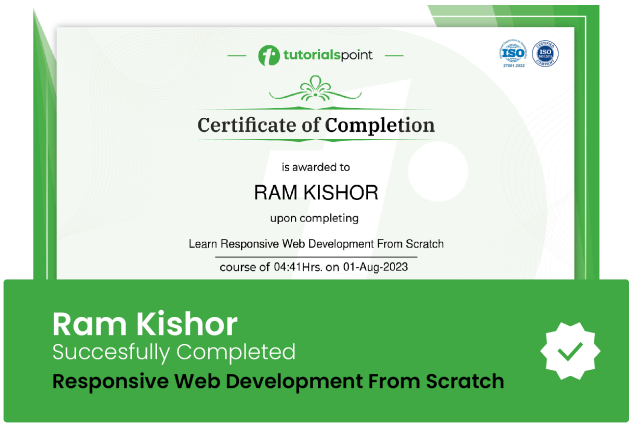The Key to Microwave Engineering: Transmission Lines
The initial step towards mastering high-frequency electronics.

Lectures -30
Duration -2.5 hours

30-days Money-Back Guarantee
Get your team access to 10000+ top Tutorials Point courses anytime, anywhere.
Course Description
A must-have knowledge for every E.E. engineer in the era of wireless communication, high-frequency and high-speed electronics.
- Do you feel challenged by transmission line and its significance in modern electronic systems?
- Are you intrigued by high-frequency electronics and the mysteries of microwave engineering?
- Are you seeking a clear, concise introduction to microwave engineering that will empower you to excel in your design?
Look no further than "The Key to Microwave Engineering: Transmission Lines" - The third course in The Tao of Phasor Series.
The goal of this course is to make transmission line theory more accessible in the simplest way possible.
This course is not just about analyzing transmission lines with phasors:
- With high-quality content and insightful lessons, you'll have a solid foundation in transmission line theory.
- Our focus is not just on the HOW, but also on the WHY and the evolution of analytical methods in this field.
- We will point out the key to turn the electromagnetic perspective into the circuit perspective.
- We will visually demonstrate the propagation of voltage and current waves through time and position on a line.
- We will provide a concrete illustration of the physical significance of the characteristic impedance.
- Without difficult math!
By the end of this course:
- You'll have a solid foundation in resonance, common filters, and transmission line theory that underpin microwave engineering and will impact your entire electrical engineering career.
- You'll learn about the properties and behavior of transmission lines, such as wavelength, wave speed, propagation constant, cut-off frequency, standing wave, and characteristic impedance, etc. You'll also learn how they affect the performance of your circuits.
- You'll also gain a practical understanding of microstrip lines and microwave filters to avoid mistakes in implementing micropstrip lines on PCBs.
- You'll be able to design high-frequency circuits with confidence and accuracy.
Join us on this journey and get your foot into the door of microwave engineering!
Course Highlights:
- LC Buckets and Resonance
- 28 Common Filters (1) - All passive elements
- 28 Common Filters (2) - Amplifiers come into play
- Types of Transmission Line
- Small Segment of Transmission Line
- Infinite-length Line
- Solve Transmission Line Equations By Phasor
- Lossless Line and Solution of Waves on Infinite Lossless Line
- Direction of Wave Propagation
- Wavelength and Wave Velocity
- Wavelength and Velocity in Medium
- Wave Propagation on an Infinite Lossless Line
- Observing Wave Propagation on the Line
- Definition of Characteristic Impedance
- Another Point of View of Characteristic Impedance
- Cut-off Frequency
- Physical Meaning of Characteristic Impedance
- Wave Inteferences
- Finite Line and Standing Wave
- Reflection Coefficient
- Transmission Line Effect
- Short- and Open-terminated Lines
- Quater-wave Line
- Half-wave Line
- Example
- Microstrip Line
- Insights
Who this course is for:
- Students studying E.E. who are interested in specializing in the field of microwave engineering and want to build a strong foundation. This course is for you!
- Engineers who want to expand their knowledge and gain a comprehensive understanding of transmission lines, which are the stepping stone to microwave engineering. This course is for you!
- Educators who are teaching courses in microwave engineering or transmission lines and want to supplement their curriculum with high-quality content. This course is for you!
- Examination candidates seeking a way to gain the knowledge necessary to succeed. This is for you!
- Anyone who wants to learn about transmission lines and their importance in microwave engineering. This course is for you!
Goals
What will you learn in this course:
- Concepts that can be applied to real-world engineering problems.
- The fundamental principles of microwave transmission lines, including their characteristics, behavior, and applications.
- Understand what the transmission line effect is, how it is caused, and how it affects the circuit.
- The critical role that transmission lines play in the design and performance of microwave circuits and systems.
Prerequisites
What are the prerequisites for this course?
- Basic knowledge of circuitry.
- Basic understanding of phasors is helpful, but not a neccessity.

Curriculum
Check out the detailed breakdown of what’s inside the course
Course Overview
1 Lectures
-
Overview 02:08 02:08
Resonance and Filter
3 Lectures

Transmission Line
11 Lectures

Characteristic Impedance
4 Lectures

Transmission Line Effect
9 Lectures

Summary
2 Lectures

Instructor Details

Dr. Simen Li
Course Certificate
Use your certificate to make a career change or to advance in your current career.

Our students work
with the Best


































Related Video Courses
View MoreAnnual Membership
Become a valued member of Tutorials Point and enjoy unlimited access to our vast library of top-rated Video Courses
Subscribe now
Online Certifications
Master prominent technologies at full length and become a valued certified professional.
Explore Now


 Updated on May, 2024
Updated on May, 2024
 Language - English
Language - English